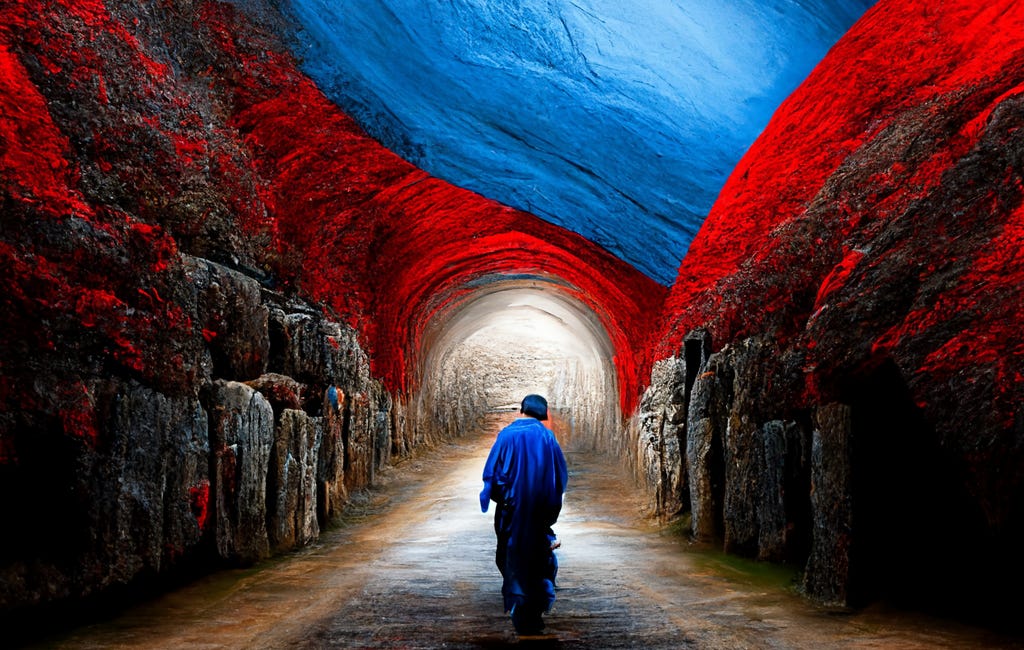The one-hundred-ninety-mile-an-hour gust drove rain through Nathaniel Gates’ Gore-Tex jacket as if the rain were a saber to a newspaper.
Nathaniel would have turned around to double-check the square, heat and cold-resistant Uber Eats container on the back of his 500-watt Haibike e-bike that contained spaghetti carbonara and a side of garlic bread from Giovani’s Bistro, but the storm’s fierceness forced him to keep both hands on the handlebars.
Hurricane Noah turned Manhattan into a gray abyss. His bike’s light was useless against the storm, and he wasn’t even sure it was still on.
As he pedaled along Broadway, street signs took flight, and small cars unmoored from the asphalt. Buildings groaned as the wind tore through Manhattan’s canyons.
Crowds lined the road as he crossed the finish line at the Olympics in first place. Symphonic cheers and popping champagne bottles filled the air as Nathaniel’s tire passed the red line, his arms high. Spectators tossed a thousand red roses.
A mirage.
Nathaniel would never make it into the Olympics—he had given up those unaffordable dreams long ago—but he would be the best Uber Eats person in New York.
He now was on the street he hated: Forty-Second and Broadway, where an enormous Olympic Cycling Team recruiting poster stood two stories tall.
Acid burned his belly, and rusted metal filled his mouth every time he passed that sign, a cruel taunt.
His bike’s battery drained fast, the human-engineered motor losing its battle against the storm’s limitless energy, but his leg muscles would power him through to his destination on Ninety First and Park Avenue. He would be exhausted to within minutes of collapse but would relish the surprise on the customer’s face when, in fact, Uber Eats had persevered during a storm that had flipped the city’s power switch to off.
My personal Olympic challenge.
Nathaniel was the only Uber Eats delivery driver on the street.
He was also the only person on any Manhattan street because being outside was madness. The wind howled like a cyclops blinded in its one eye.
It was Nathaniel’s will versus the storm.
He reached for the power gel tucked inside his jersey’s elastic pocket, but his grip was no match for the wind’s fury. The jel pack flew, ramming into the twenty-five-story One Times Square building like a missile, its force tottering the concrete and iron tower.
Lightning struck Nathaniel’s bike, and a brilliant white and blue aura enveloped him.
Clementine Walters pedaled north along Broadway. On an ordinary day, she biked carefully, lest the rough cobblestone street shatter a milk bottle—or few. Her bike’s front basket held twenty-two bottles; the cart she pulled contained another sixty-four. She’d never broken a bottle, but it had happened to every other member of the Milk Bike Brigade, the sixteen-person team of Manhattan delivery girls who brought fresh milk to New Yorkers every morning.
Her bike’s cast iron frame bowed from the weight of the liquid and its glass containers.
Clementine was in tune with the rattling bottles; she paid close attention to the pitch and frequency as they banged together. Her ears told her when to slow down and when she could cycle at full speed and then some.
But today, Tuesday, April 6, 1897, there was nothing except the roar of an enraged wind from the north. So strong was the wind that she felt she was moving slower than a donkey loaded with pots, pans, and sundries. She usually gauged her speed against the trot of horses, but no horses were out and about. This morning, only ghosts inhabited New York, their voices shrill winds.
Somebody left a cow tied to a post. The rope looked new and robust, the knots secure, but whether the cord and knots were good enough to keep the cow from becoming airborne, Clementine couldn’t say.
Though the sun had risen, swirling octopus ink shrouded the city.
Clementine would deliver all her milk intact, hoping her customers would hear her knocking over the deafening wind and thunder. She would pound and pound until the doors opened, confident that her strength would overcome the storm’s ruckus.
It will be good exercise for me, she thought.
Clementine pedaled so hard her leg muscles were afire, turning the rain into steam where it touched her skin.
Every pedal push against the wind, every pound against a door was good exercise.
Harder, faster, she said.
She envisioned herself crossing the finish line at the Paris Olympics in 1900 on a shiny Wright Brothers' Van Cleve. She felt the weight of the Olympic cycling gold medal around her neck. While she could not imagine the life she’d lead after winning a gold medal at the world’s second Olympics, whatever that life was, it would not be delivering milk early in the morning.
But that will never come to pass. The Olympics are a man’s world, and I am just a woman—at seventeen, still a girl.
Lightning struck Clementine’s bike, and a brilliant white and blue aura enveloped her, the same as Nathaniel.
Brightness stung her eyes, and she shut them. The air was still; strange songs from all compass points replaced the wind. She thought she was dead, standing before heaven's gates.
How many angels will there be?
When, after a minute, she opened her eyes to a huge picture of a dozen men and women on bicycles along with writing that said, “Olympic Cycling Trials Start July 1,” Clementine’s skin tingled and she smiled more broadly than ever before.
If you enjoyed The Bicyclists, I think you’ll also like my story, The Tunnel.







Always the twist!!!
2 cyclists, different eras, both both wanting to compete in the Olympics. And the strange bolt of lightening. Where does it take them? What happens next?